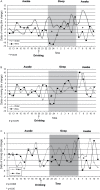Differential Effect of Initiating Moderate Red Wine Consumption on 24-h Blood Pressure by Alcohol Dehydrogenase Genotypes: Randomized Trial in Type 2 Diabetes
- PMID: 26232779
- PMCID: PMC4886485
- DOI: 10.1093/ajh/hpv126
Differential Effect of Initiating Moderate Red Wine Consumption on 24-h Blood Pressure by Alcohol Dehydrogenase Genotypes: Randomized Trial in Type 2 Diabetes
Abstract
Aims: Observational studies report inconsistent associations between moderate alcohol intake and blood pressure (BP). In a sub-study of a larger randomized controlled trial, we assessed the effect of initiating moderate red wine consumption on 24-h BP recordings and the effect of a common genetic variant of alcohol dehydrogenases (ADH) among patients with type 2 diabetes.
Methods: Fifty-four type 2 diabetes, alcohol abstainers were randomized to consume 150 ml/dinner dry red wine or mineral water. Both groups were guided to adhere to a Mediterranean diet, without caloric restriction. We measured 24-h ambulatory BP monitoring (ABPM) at baseline and after 6 months.
Results: Participants (age = 57 years; 85% men; mean 24-h BP = 129/77 mm Hg) had 92% 6-month retention. After 6 months of intervention, the average 24-h BP did not differ between the wine and water groups. A transient decrease in BP was observed in the red wine group at midnight (3-4 hours after wine intake: systolic BP: red wine = -10.6mm Hg vs. mineral water = +2.3 mm Hg; P = 0.031) and the following morning at 7-9 am (red wine: -6.2mm Hg vs. mineral water: +5.6mm Hg; P = 0.014). In a second post hoc sub-analysis among the red wine consumers, individuals who were homozygous for the gene encoding ADH1B*2 variant (Arg48His; rs1229984, TT, fast ethanol metabolizers), exhibited a reduction in mean 24-h systolic BP (-8.0mm Hg vs. +3.7 mm Hg; P = 0.002) and pulse pressure (-3.8 mm Hg vs. +1.2 mm Hg; P = 0.032) compared to heterozygotes and those homozygous for the ADH1B*1 variant (CC, slow metabolizers).
Conclusions: Initiating moderate red wine consumption at dinner among type 2 diabetes patients does not have a discernable effect on mean 24-h BP. Yet, a modest temporal BP reduction could be documented, and a more pronounced BP-lowering effect is suggested among fast ethanol metabolizers.
Clinical trials registration: ClinicalTrials.gov Identifier: NCT00784433.
Keywords: ambulatory measurement; blood pressure; hypertension; moderate alcohol; pulse pressure; randomized controlled trial; type 2 diabetes..
© American Journal of Hypertension, Ltd 2015. All rights reserved. For Permissions, please email: journals.permissions@oup.com.
Figures



References
-
- Guidelines Subcommittee. World Health Organization–International Society of Hypertension Guidelines for the Management of Hypertension. J Hypertens 1999; 17:151–183 - PubMed
-
- Tanasescu M, Hu FB, Willett WC, Stampfer MJ, Rimm EB. Alcohol consumption and risk of coronary heart disease among men with type 2 diabetes mellitus. J Am Coll Cardiol 2001; 38:1836–1842. - PubMed
-
- Solomon CG, Hu FB, Stampfer MJ, Colditz GA, Speizer FE, Rimm EB, Willett WC, Manson JE. Moderate alcohol consumption and risk of coronary heart disease among women with type 2 diabetes mellitus. Circulation 2000; 102:494–499. - PubMed
Publication types
MeSH terms
Substances
Associated data
LinkOut - more resources
Full Text Sources
Other Literature Sources
Medical

